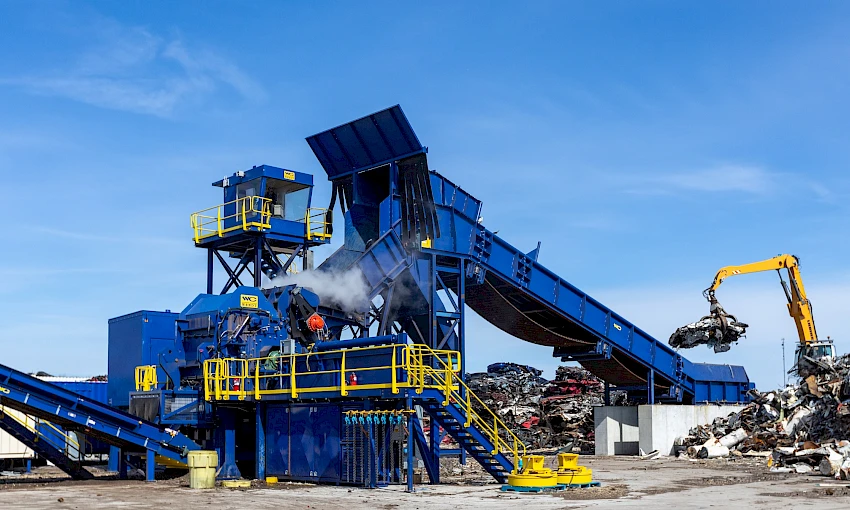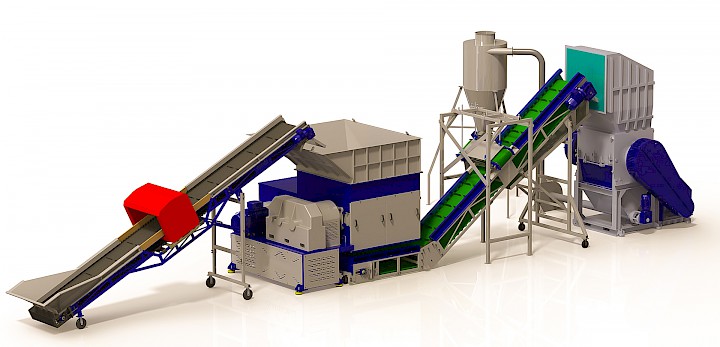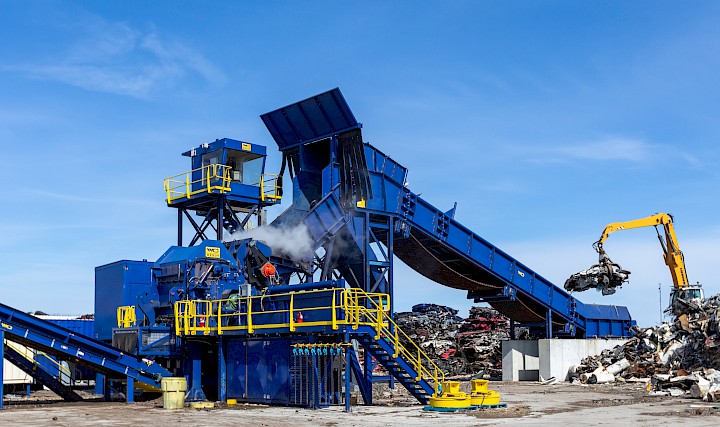
Recycling Facility Installation: Build a Sustainable Future with Aces Process
Take a significant step towards a greener future with Aces Process and optimize your recycling facility for maximum efficiency and impact! We utilize cutting-edge technology and state-of-the-art machinery in every recycling plant we install. Not only will you contribute to environmental protection, but you'll also optimize waste management with a modern, high-performing facility.
Aces Process's recycling facilities streamline the recycling of various materials, including metal, paper, plastic, glass, and more. This is crucial for conserving resources, reducing waste volume, and maintaining a clean environment.
As a leader in recycling machinery production and facility installation, Aces Process delivers unparalleled service and expertise. Partner with us to make a positive environmental impact and contribute to a cleaner planet!
The Importance of Recycling in Today's World
In a world facing challenges like resource depletion, growing waste generation, and environmental pollution, recycling has emerged as a crucial solution. By transforming waste into reusable materials, recycling contributes to the preservation of natural resources and reduces environmental pollution. Recycling facilities play a vital role in managing the collection, sorting, processing, and recovery of waste materials.

Establishing a Recycling Facility: A Smart Investment
Setting up a recycling facility is a significant investment opportunity for environmentally conscious businesses. However, it requires specialized expertise and technical knowledge. The installation process involves careful consideration of various factors, including:
-
Selecting appropriate equipment
-
Designing and constructing the facility
-
Managing waste collection and sorting processes
-
Automating recycling processes
Cost-Effectiveness and Long-Term Benefits
While the initial investment for a recycling facility can vary based on size, capacity, and technology, the long-term economic advantages are substantial. Recycling reduces raw material costs, saves energy, and lowers operating expenses compared to the penalties associated with improper waste disposal.
Recycling Facilities: Catering to Diverse Needs
Recycling facilities can be established by various entities, from small businesses and local governments to large-scale enterprises. Smaller facilities typically handle local waste collection, sorting, and recovery, while larger plants utilize advanced technologies to process industrial waste, wastewater, electronic waste, and more.
Recycling: A Guide to Sustainable Waste Management and Recycling Facility Installation
Recycling is the process of transforming waste materials into reusable objects to prevent waste of potentially useful materials, reduce the consumption of fresh raw materials, reduce energy usage, reduce air pollution (from incineration) and water pollution (from landfilling) by reducing the need for "conventional" waste disposal, and lower greenhouse gas emissions as compared to plastic production.
Recycling is a key component of modern waste reduction and is the third component of the "Reduce, Reuse, and Recycle" waste hierarchy.
What is the Importance of Recycling for the Environment and Industry?
Recycling offers significant benefits for both the environment and industry:
Environmental Benefits:
-
Reduces waste: Prevents valuable materials from ending up in landfills, conserving space and reducing pollution.
-
Conserves natural resources: Decreases the need to extract new raw materials, protecting ecosystems and reducing habitat destruction.
-
Saves energy: Recycling often requires less energy than producing new materials from raw sources.
-
Reduces pollution: Minimizes air and water pollution associated with manufacturing and waste disposal.
-
Lowers greenhouse gas emissions: Contributes to mitigating climate change by reducing energy consumption and waste.
Industrial Benefits:
-
Reduces costs: Lowers raw material and processing costs for industries.
-
Increases efficiency: Enables industries to utilize resources more effectively.
-
Creates jobs: Supports new employment opportunities in the recycling and manufacturing sectors.
-
Promotes innovation: Drives the development of new recycling technologies and sustainable materials.
Recycling is essential for environmental sustainability and should be adopted at both individual and institutional levels. Proper waste separation and recycling contribute to the preservation of natural resources and a healthier planet.

What Machines Are Used in Recycling Facilities?
Recycling facilities rely on a diverse array of specialized machinery to efficiently process and recover valuable materials from waste streams. Here are some of the most common types of recycling equipment:
-
Conveyor Belts: These motorized belts transport materials throughout the facility, facilitating sorting and automation.
-
Recycling Screens: Vibrating or rotating screens separate materials by size and type, ensuring efficient processing.
-
Magnetic Separators: Powerful magnets extract ferrous metals (like iron and steel) from the waste stream.
-
Optical Sorters: Advanced sensors and technology identify and separate materials based on their optical properties (color, reflectivity).
-
Bale Presses: These machines compress sorted materials into compact bales for efficient storage and transportation.
-
Plastic Granulators: Grind plastic waste into small pellets, ready for use in manufacturing new plastic products.
-
Glass Crushers: Crush glass into cullet, a valuable material used in the production of new glass.
-
Shredders and Grinders: Reduce the size of bulky materials like plastics, paper, and metals for easier processing and sorting.
-
Washing and Cleaning Equipment: Remove contaminants and impurities from materials like plastics and paper, improving their quality.
-
Material Densifiers: Compact and densify materials like foam and packaging, reducing their volume for efficient storage and transportation.
The specific machines used in a recycling facility depend on several factors, including the types of materials processed, the facility's capacity, and the desired end products.
Is Metal Recyclable?
Yes, metal is highly recyclable. Metal recycling involves collecting, sorting, processing, and ultimately using used metal products or waste to create new metal products. This process offers numerous benefits:
-
Conserves natural resources: Reduces the need to mine and extract new ores.
-
Saves energy: Recycling metal requires significantly less energy than producing it from raw materials.
-
Reduces landfill waste: Keeps metal out of landfills, extending their lifespan and reducing environmental impact.
-
Reduces greenhouse gas emissions: Lowers greenhouse gas emissions associated with metal production.
Commonly recycled metals include steel, aluminum, copper, iron, lead, nickel, and various alloys. These recycled metals can be used to manufacture a wide range of products, such as:
-
Construction materials: Steel beams, rebar, and other structural components.
-
Packaging: Aluminum cans, steel food containers.
-
Automotive parts: Car bodies, engine components.
-
Household appliances: Refrigerators, washing machines, ovens.
-
Electronics: Circuit boards, wiring, and other components.
What Do Recycling Facilities Do?
Recycling facilities are essential for managing waste and recovering valuable materials. They play a crucial role in minimizing environmental impact and promoting resource efficiency. Here's a simplified overview of the typical processes in a recycling facility:
-
Collection: Recyclable materials are collected from various sources, including households, businesses, and public spaces.
-
Sorting: Collected waste is sorted into different categories based on material type (e.g., plastic, paper, glass, metal).
-
Processing: Sorted materials undergo various processes to prepare them for recycling, such as cleaning, shredding, crushing, and baling.
-
Recycling: Processed materials are sent to manufacturers who use them to create new products.
-
Energy Recovery: Non-recyclable waste may be used to generate energy through processes like incineration or anaerobic digestion.
Which Products Cannot Be Recycled?
While recycling technology is constantly advancing, some materials are still challenging to recycle or may not be accepted by all recycling facilities. These typically include:
-
Polystyrene foam (Styrofoam): Often not accepted due to its low density and difficulty in processing.
-
Certain plastics: Some plastics, like thermosets and composite plastics, are difficult to recycle due to their complex composition.
-
Contaminated materials: Items contaminated with food waste or hazardous materials may not be recyclable.
-
Laminated materials: Materials made from combined layers of different materials (e.g., paper and plastic) can be challenging to separate and recycle.
-
Ceramics and porcelain: These materials are generally not accepted in curbside recycling programs.
It's important to check with your local recycling guidelines to determine which materials are accepted in your area.
How to Install a Recycling Facility
Opening a recycling facility can be a rewarding but complex endeavor. It requires careful planning, adherence to regulations, and a commitment to environmental responsibility. Here's a step-by-step guide to help you navigate the process:
-
Research and Planning:
-
Conduct a Needs Assessment: Analyze the types and quantities of recyclable materials generated in your area. Identify potential markets for the recovered materials.
-
Develop a Business Plan: Outline your business objectives, target market, operational plan, financial projections, and marketing strategy.
-
Choose a Suitable Location: Consider factors like zoning regulations, proximity to waste sources, transportation access, and environmental impact.
-
-
Regulatory Compliance:
-
Research Local Regulations: Understand the specific permits and licenses required to operate a recycling facility in your area.
-
Environmental Permits: Obtain necessary environmental permits related to air emissions, wastewater discharge, and waste handling.
-
Health and Safety Compliance: Ensure your facility complies with occupational health and safety regulations to protect your workers.
-
-
Facility Design and Equipment:
-
Design for Efficiency: Optimize the layout of your facility to ensure a smooth flow of materials and efficient processing.
-
Select Appropriate Equipment: Choose recycling machinery that aligns with the types and volume of materials you plan to process. This may include conveyor belts, sorting systems, balers, shredders, and more.
-
Consider Automation: Explore automation technologies to improve efficiency and reduce labor costs.
-
-
Operational Planning:
-
Waste Collection and Sorting: Establish efficient systems for collecting and sorting recyclable materials.
-
Processing and Recovery: Develop processes for cleaning, processing, and transforming recovered materials into reusable forms.
-
Quality Control: Implement quality control measures to ensure the quality of the recovered materials meets industry standards.
-
-
Financial Planning:
-
Secure Funding: Explore funding options, such as loans, grants, or private investment.
-
Develop a Budget: Estimate your startup costs, operating expenses, and projected revenue.
-
Explore Incentives: Research potential tax breaks or incentives for recycling businesses in your area.
-
-
Environmental Responsibility:
-
Minimize Environmental Impact: Implement measures to reduce your facility's environmental footprint, such as energy-efficient equipment and water conservation practices.
-
Waste Management Plan: Develop a comprehensive waste management plan to handle any residual waste generated by your facility.
-
Promote Sustainability: Educate your community about the importance of recycling and encourage participation.
-
Ready to launch your recycling business?
Contact Aces Process today for expert guidance and support in setting up your recycling facility.














































